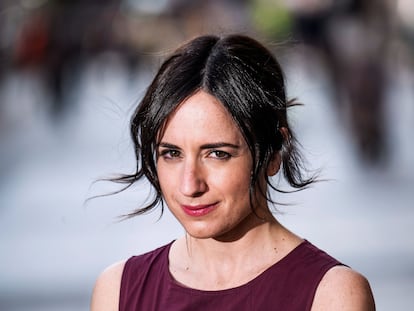Emma Cline: ‘No one is a monster 24 hours a day, not even Harvey Weinstein’
The California-born author, whose work focuses on moral ambiguity, talks to EL PAÍS about why she is drawn to characters with a complex relationship to power

Emma Cline shot to fame aged 25, when she signed a $2-million (€1.7 million) deal to write three books following frenzied bidding by publishing houses. She has done little to disappoint since then, specializing in honing in on situations of extreme moral ambiguity with an unblinking stare.
Her 2016 debut novel The Girls cemented her reputation for digging into life’s queasy grey areas. The book centers on a 14-year-old girl who toys with joining a cult with a more than passing resemblance to the infamous Manson Family. Instead of entering the mind of the psychopath like so many before her, the California-born author decided to focus on the young women drawn to the cult. These girls might have been capable of committing atrocious crimes with angelic smiles, but were also victims themselves.
Politics requires drawing boundaries, and for that reason, it’s not a space in which I can operate as an author
In The Girls, there is constant tension between the youth and beauty of the characters, the stunning Californian landscapes, and the dark and ominous sentences that are themselves exquisitely written. “There’s something very disturbing about America’s heartland. It’s a gorgeous, magnetic place, but it hides an ugliness that has been repressed for a long time and is now coming to the surface with movements like Black Lives Matter,” Cline says. “For a lot of people, it’s hard to accept that it can be a wonderful place and, at the same time, hide that rottenness inside.”
When the book was published, the global #MeToo movement against sexual abuse had yet to begin, and the novel’s handling of issues of consent and manipulation was not always immediately welcomed. “I was even met with some resistance,” Cline, now 31, tells EL PAÍS on a video call from her brightly lit bedroom in the Silver Lake neighborhood of Los Angeles. “I was told that my portrayal was too extreme, that it happened in the 1960s, but that everything had improved a lot since then. One of the things I was interested in saying was precisely that it didn’t end in that decade.”
But this perspective changed with the sexual assault case against Hollywood producer Harvey Weinstein, whose fall from grace is the subject of Cline’s new book Harvey. Written during Weinstein’s rape and sexual assault trial in 2020, Cline delves directly into her notorious main character’s vulnerability, while never using his family name. “I read an article, I think in The New York Times, that described how Weinstein was waiting for the verdict: at a friend’s house, Googling himself and watching a lot of Netflix series,” she says. This banal reaction as his world collapsed around him fascinated Cline.

Harvey purposely walks a tightrope between empathy and condemnation of the disgraced producer. “I understand the desire to portray people as heroes or villains. We all like the binary choice of black and white. Our brains enjoy those categorizations. But I’m not a lawmaker, I’m not in charge of legislating on sexual harassment in the workplace. What I am is a novelist, and so I have to explore all the grays,” Cline explains. “Fiction can never be subject to moral scrutiny, because it doesn’t work by the standards on which we operate as a society. And that’s what I think is great about it.”
The novel Harvey takes place in the 24 hours before the protagonist receives his sentence [he was handed down 23 years in prison]. The thought that most occupies Weinstein during this time is a future adaptation of White Noise, the supposedly unfilmable novel of the same name by Don DeLillo. (Harvey was first published in The New Yorker in June 2020 under the title White Noise.) His initial confidence – “He believed, truly, that he would be exonerated. How could he not be? This was America” – gradually shatters into despair as he realizes he is on his own.
If we are good, it is by sheer moral luck. We’re good because the forces of the universe have spared us the opportunity to behave badly
Cline doesn’t believe that digging into Weinstein’s psychology is a dangerous exercise. “Writing about a person I have no empathy for or interest in doesn’t strike me as a challenge. If I’m going to write about someone, it’s because I see a human being with many different faces, the same ones I have. No one is a monster 24 hours a day, not even him,” she asserts. That is far from saying she does not agree with Weinstein’s fate. “I think it’s great that people pay for having caused pain to others. But, once again, that’s not my job. Actually, fiction is not a good tool for activism,” she says. “I supported #MeToo, but that has nothing to do with my writing. Politics requires drawing boundaries, and for that reason, it’s not a space in which I can operate as an author. If we start asking whether an author – or, worse, a character – has exemplary morals, that’s the end.”
Her recent book of short stories, Daddy, is also filled with older men who exhibit less than exemplary behavior. “I’m interested in talking about that generation of men who must find their place in a world that has changed and where they feel they no longer fit,” says Cline. In a recent conversation with the director Brian de Palma, published by the online magazine Interview, the writer admitted to having a difficult relationship with her own father, though she declines to talk further about it during our interview. Where does her interest in the boomer generation come from? “Things have changed a lot in a very short period of time. Things that were normal five years ago are now totally unacceptable. And there is a whole generation of men and women who are disoriented and alienated by this new culture,” Cline responds.
The writer does not believe that human beings are good by definition. “If we are good, it is by sheer moral luck,” she says. “We’re good because the forces of the universe have spared us the opportunity to behave badly, because we’ve had the good fortune to drive drunk without killing anyone on the way home.” People are not, she believes, evil by default, but we are all capable of exercising evil. “That’s what many people find intolerable and what produces these caricatured depictions of characters like Weinstein, as if they are totally different from us, as if they don’t belong to our species.” Her books are a reminder that they are part of us. Could anyone end up acting like Harvey? “Not necessarily in the same way, but, given the right circumstances, if one benefits from decades and decades of power and money, it seems hypocritical to me to think he was just an anomaly,” she says.
Tu suscripción se está usando en otro dispositivo
¿Quieres añadir otro usuario a tu suscripción?
Si continúas leyendo en este dispositivo, no se podrá leer en el otro.
FlechaTu suscripción se está usando en otro dispositivo y solo puedes acceder a EL PAÍS desde un dispositivo a la vez.
Si quieres compartir tu cuenta, cambia tu suscripción a la modalidad Premium, así podrás añadir otro usuario. Cada uno accederá con su propia cuenta de email, lo que os permitirá personalizar vuestra experiencia en EL PAÍS.
En el caso de no saber quién está usando tu cuenta, te recomendamos cambiar tu contraseña aquí.
Si decides continuar compartiendo tu cuenta, este mensaje se mostrará en tu dispositivo y en el de la otra persona que está usando tu cuenta de forma indefinida, afectando a tu experiencia de lectura. Puedes consultar aquí los términos y condiciones de la suscripción digital.









































